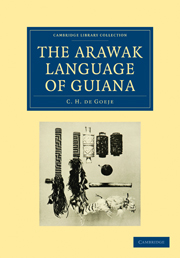Book contents
- Frontmatter
- Preface
- Contents
- List of literature
- Rules for pronunciation and abbreviations
- Alphabetical Index
- German words in Schultz' texts
- CHAPTER I Finite verb
- CHAPTER II Character of the Arawak words
- CHAPTER III Infinite verb
- CHAPTER IV Auxiliary verb a
- CHAPTER V Intensives, conjunctions, etc.
- CHAPTER VI K; B
- CHAPTER VII F; P; B
- CHAPTER VIII M
- CHAPTER IX N
- CHAPTER X D
- CHAPTER XI T
- CHAPTER XII Formation of verbs, etc.
- CHAPTER XIII L; R
- CHAPTER XIV H
- CHAPTER XV S
- CHAPTER XVI Vowels, diphotongs; colours
- CHAPTER XVII Classes of utterances; numerals
- CHAPTER XVIII Man
- CHAPTER XIX Foreign words. Arawak and Arawak-Maipure
- CHAPTER XX Origins of the Arawak language
- APPENDIX: Information collected in Surinam in 1907 and in 1928
- Frontmatter
- Preface
- Contents
- List of literature
- Rules for pronunciation and abbreviations
- Alphabetical Index
- German words in Schultz' texts
- CHAPTER I Finite verb
- CHAPTER II Character of the Arawak words
- CHAPTER III Infinite verb
- CHAPTER IV Auxiliary verb a
- CHAPTER V Intensives, conjunctions, etc.
- CHAPTER VI K; B
- CHAPTER VII F; P; B
- CHAPTER VIII M
- CHAPTER IX N
- CHAPTER X D
- CHAPTER XI T
- CHAPTER XII Formation of verbs, etc.
- CHAPTER XIII L; R
- CHAPTER XIV H
- CHAPTER XV S
- CHAPTER XVI Vowels, diphotongs; colours
- CHAPTER XVII Classes of utterances; numerals
- CHAPTER XVIII Man
- CHAPTER XIX Foreign words. Arawak and Arawak-Maipure
- CHAPTER XX Origins of the Arawak language
- APPENDIX: Information collected in Surinam in 1907 and in 1928
Summary
The n is used in the Arawak language, in order to indicate “firmness or substantiality of a neutral character”. The consonants give form, firmness, to the shapeless mass indicated by the vowels; the d, t, k, m etc. do this, each in its own characteristic way; the n does the same, but without any specific character.
Ni.
a) nii-ka-n, nii-ma-n, a while, a little.
niikan n-a k-ibena-n, and after they had tarried there a space [they were let go], niiman t-adiki ajinama-ci-no yumun anda goba l-amun, and after a while came unto him they that stood by, h-ahakobu-in bia niiman, [come] and rest (ye) a while, kena lo-kwaiaba i l-icirikidi-n bia t-eribo-area niiman, and (he) prayed him that he would thrust out a little from the land;
b) S. ni rubu kurru, a long time, no little, no small, not a few;
c) S. ni-kebé, to occur immediately, straightway, forthwith;
d) -ni, something that really is, or shall be, see § 25;
e) 1) ani, anye, anyi, onyi, a thing, a thing possessed; see examples in § 32, and:
alika-i koro ajia goba l-amuni-sia o-konomun, Daii a-ni toho, ma-in; to-moroa na-makwa n-anye to-makwa, neither said any of them that ought of the things he possessed was his own; but they had all things common.
- Type
- Chapter
- Information
- The Arawak Language of Guiana , pp. 118 - 123Publisher: Cambridge University PressPrint publication year: 2009First published in: 1928



